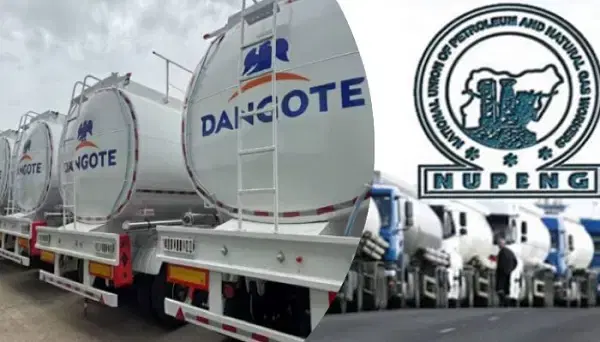Dangote, NUPENG face-off: Lessons for stakeholders

By Victor Ahiuma-Young & Johnbosco Agbakwuru
The recent dispute between the Nigeria Union of Petroleum and Natural Gas Workers, NUPENG, and Dangote Refinery, may have ended for now, but the fallouts should provide critical lessons for stakeholders in nation’s industrial relations space, particularly on unionisation, industrial relations, and rule of law.
Read Also: NUPENG, Dangote refinery settle rift
The conflict arose after the Dangote management allegedly created the Direct Trucking Company Drivers Association, DTCDA, a parallel drivers’ association intended to act as a substitute for NUPENG.
NUPENG condemned the move as illegal, asserting that it violated workers’ rights to unionise and engage in collective bargaining. The Ministry of Labour had earlier declared the DTCDA unlawful, affirming that only NUPENG is legally recognised to represent refinery employees.
The dispute escalated when oil workers embarked on a strike, demanding recognition of NUPENG and the disbandment of the DTCDA. The strike disrupted petroleum product loading.
An agreement was signed on Tuesday at the Department of State Services (DSS) headquarters in Abuja, in the presence of the Minister of Finance and other officials. Minister of Labour and Employment, Muhammadu Dingyadi, said the DSS venue was deliberately chosen to provide a neutral and secure environment for negotiations.
Addressing journalists, Dingyadi remarked: “The intervention of the Ministry was necessary to protect the rights of workers and ensure compliance with Nigerian labour laws. No employer should interfere with the freedom of workers to join unions of their choice. We are satisfied that today’s outcome restores industrial harmony and strengthens the rule of law.”
NUPENG President’s remarks
NUPENG President, Williams Akporeha, confirmed that all contentious issues had been resolved.
“We signed the agreement, and members have agreed to the unionisation of workers at Dangote Petrochemical Refinery. The strike is called off immediately, and tankers have resumed loading petroleum products,” he said.
On earlier claims of a walkout by Dangote representatives, Akporeha clarified:
“They denied any walkout. The representative left briefly due to hunger and a medical condition. There was no formal walkout. Monday night’s stalemate was due to attempts by management to insert clauses we could not accept, but today we have harmonised all issues and signed the agreement.”
He further emphasised the key point of contention:
“The management had no right to create the DTCDA. Going forward, no union will be forced on workers, and no parallel union will be recognised. This is a major victory for lawful unionisation and the rights of our members.”
Legal and International Context
The resolution underscores the triumph of the rule of law in industrial relations, anchored in both Nigerian labour legislation and international standards: Trade Unions Act, Cap T14, LFN 2004 guarantees workers’ rights to form and join unions of their choice, recognising only legally registered unions.
Labour Act, 2004 protects employees’ rights to collective bargaining, strike action, and fair representation, empowering the Ministry of Labour to intervene in disputes, Section 40 of the Constitution of the Federal Republic of Nigeria, 1999 guarantees freedom of association
Similarly, section 44 prohibits employer interference in lawful associations.
Also, Internationally, Nigeria’s obligations under International Labour Organization (ILO) Conventions further reinforce the outcome: ILO Convention No. 87 (Freedom of Association, 1948) ensures workers can establish and join unions freely without employer interference.
ILO Convention No. 98 (Right to Organise and Collective Bargaining, 1949) protects workers against anti-union discrimination and guarantees collective bargaining rights and the ILO Committee on Freedom of Association Guidelines prohibit parallel unions or forced unionisation, reinforcing that employers must recognise only legally chosen unions.
Lessons for Stakeholders
Labour analysts say the outcome is a major victory for workers’ rights in Nigeria. It serves as a precedent for other companies considering tactics to bypass lawful unions and highlights the need for compliance with labour laws, respect for due process, and adherence to international labour standards.
For workers, the agreement ensures protection of their rights to unionise, participate in collective bargaining, and engage management without fear of retaliation. For employers, it underscores the legal and regulatory risks of undermining union rights.
Looking Ahead
While the strike has been suspended and operations resumed, NUPENG leaders have vowed to remain vigilant, warning that any future attempts to circumvent lawful unionisation will be met with immediate resistance. The Ministry of Labour and Employment will continue to monitor compliance to protect workers’ rights.
The Dangote-NUPENG face-off has not only resolved a potential industrial crisis but also provided a blueprint for upholding workers’ rights, promoting industrial harmony, and ensuring that the rule of law prevails in Nigeria’s energy sector.
The post Dangote, NUPENG face-off: Lessons for stakeholders appeared first on Vanguard News.







